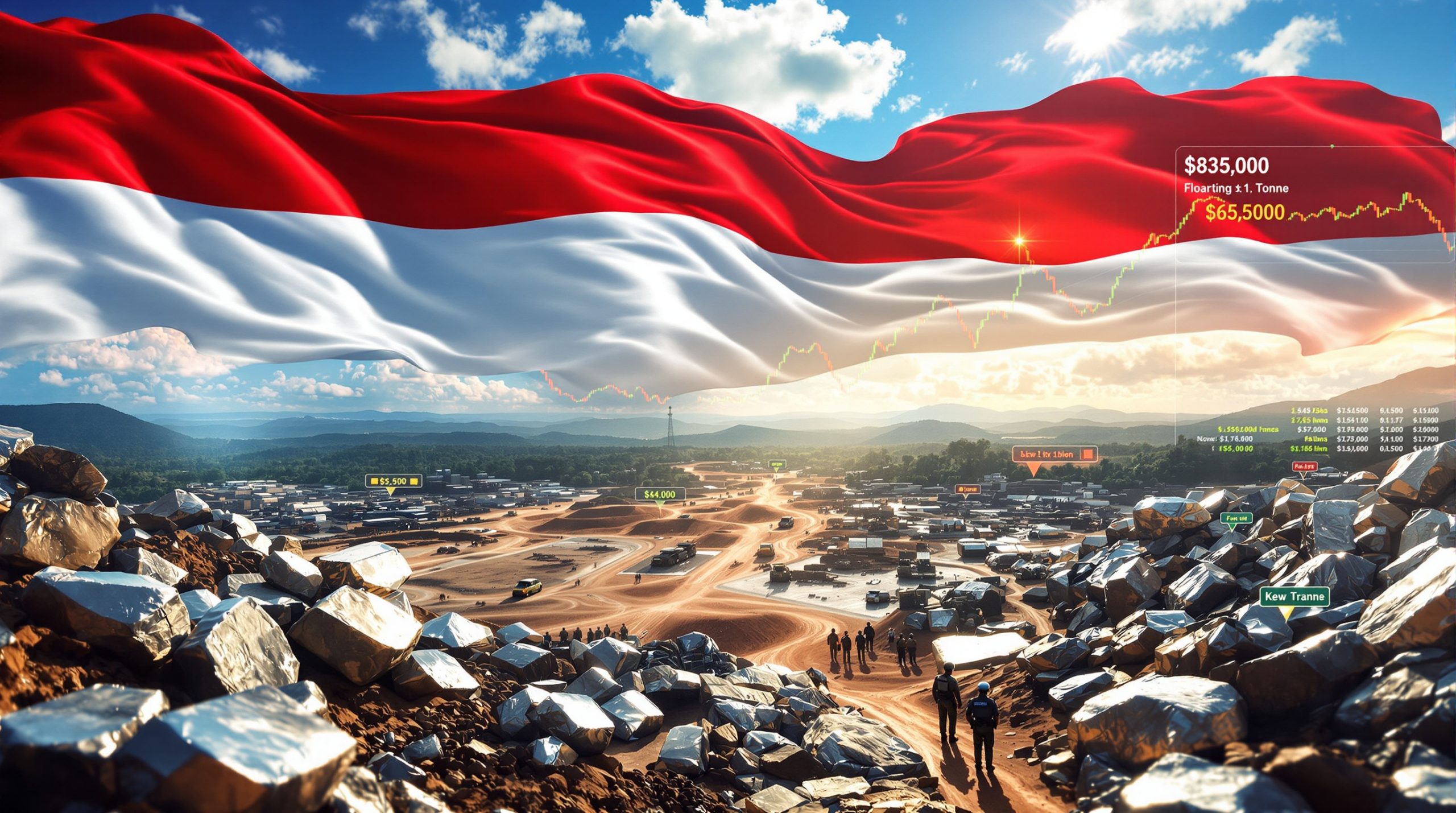Bolivia stands as one of the most intriguing yet challenging lithium investment destinations worldwide, controlling approximately 23 million metric tons of lithium reserves that represent roughly 20% of global resources. As electric vehicle adoption accelerates and battery demand intensifies throughout 2025, Bolivia lithium investment opportunity becomes increasingly significant for investors seeking exposure to next-generation energy storage opportunities. For instance, the lithium industry innovations emerging globally highlight the strategic importance of securing diverse supply sources.
The election of centrist President Rodrigo Paz in late 2025 has introduced fresh dynamics to Bolivia's long-stalled lithium sector development. Taking office on November 8, 2025, Paz's administration signals potential shifts away from the previous two decades of socialist governance that constrained international investment opportunities in the country's mineral wealth.
With global lithium markets experiencing unprecedented demand growth, Bolivia's untapped reserves offer theoretical production capacity that could dramatically reshape supply chain dynamics for electric vehicle manufacturers and battery producers seeking diversified sourcing strategies beyond current market leaders Chile and Australia.
What Makes Bolivia's Lithium Reserves Globally Significant?
Unprecedented Resource Concentration
Bolivia's lithium deposits, concentrated primarily within the Salar de Uyuni salt flats, represent the world's single largest accumulation of lithium resources. These reserves significantly exceed many established producing regions, creating potential for industrial-scale production that could support massive electric vehicle manufacturing expansion over the coming decades.
The Salar de Uyuni itself spans vast expanses of Bolivia's highland plateau, containing brine deposits with lithium concentrations that have attracted international attention despite technical extraction challenges. The salt flat serves as both a geological treasure and a culturally significant landscape that holds special meaning for Bolivia's indigenous communities.
Strategic Regional Positioning
Located within South America's "Lithium Triangle" alongside Chile and Argentina, Bolivia completes a regional concentration that collectively controls over 60% of global lithium resources. This geographic clustering creates opportunities for integrated regional supply chain development and potential cooperation frameworks that could benefit all three nations.
The proximity to established lithium operations in neighbouring countries provides infrastructure and technical knowledge advantages, while Bolivia's unique geological conditions require specialised approaches that differentiate it from traditional extraction methods employed elsewhere in the region. Furthermore, understanding lithium brine insights from Argentina can provide valuable context for Bolivia's potential development.
Value-Added Processing Vision
Unlike regional competitors that focus primarily on raw material exports, Bolivia pursues an ambitious domestic processing strategy through its state-owned enterprise Yacimientos de Litio Bolivianos (YLB). This approach aims to capture higher value-added margins by producing refined lithium carbonate and hydroxide domestically rather than exporting unprocessed brines.
The government's industrialisation vision encompasses building complete lithium value chains within Bolivia, from extraction through battery-grade chemical production, potentially positioning the country as a more integrated supplier to global battery manufacturers seeking reliable, processed inputs.
How Has Bolivia's Political Landscape Shifted Investment Prospects?
New Presidential Leadership Impact
President Rodrigo Paz's election represents a significant departure from Bolivia's previous political trajectory. His Christian Democratic party platform emphasises market-friendly policies while maintaining state oversight of strategic resources, creating potential pathways for enhanced international cooperation in lithium development.
Paz's centrist positioning offers advantages compared to more conservative alternatives, according to regional analysts. Chilean mining lawyer Pablo Hamilton noted that whilst Paz remains less clear on specific policy directions, his political position enables dialogue with both left-wing and right-wing stakeholders, potentially bringing greater investment stability.
The new administration faces immediate decisions regarding existing contracts with Chinese and Russian partners that were blocked by the previous Congress, with Paz committing to scrutinise these agreements for transparency while potentially creating opportunities for additional international participation. This development creates renewed focus on the Bolivia lithium investment opportunity as international observers assess policy changes.
Legislative Composition Changes
Paz's party lacks legislative majority, but the new parliament features predominantly centrist and right-wing representation following significant seat losses by the outgoing ruling MAS party. This composition could facilitate more investor-friendly regulatory frameworks if political cooperation prevails over partisan divisions.
The legislative shift away from socialist dominance creates potential for constitutional or legal reforms that could modify Bolivia's restrictive lithium laws, though such changes would require substantial political consensus and potentially constitutional amendments through referendum processes.
International Diplomatic Developments
U.S. Secretary of State Marco Rubio congratulated Paz on his election victory, stating that his administration marks a "transformative opportunity for both nations" after describing the previous two decades as involving "misguided administrations." This diplomatic outreach occurs as the Trump administration attempts to expand U.S. influence in critical minerals sectors to counter Chinese dominance.
The timing of Paz's election coincides with increased U.S. government focus on securing diverse lithium supply chains, potentially creating opportunities for American companies that were previously excluded from Bolivia's mineral development projects under more restrictive political environments.
What Are the Primary Technical Challenges Facing Investors?
Complex Geological Conditions
Bolivia's lithium extraction faces unique technical obstacles that distinguish it from more established operations in Chile's Atacama Desert. Traditional evaporation pond methods prove inefficient due to high naturally occurring magnesium concentrations in Bolivia's brine composition, requiring innovative extraction technologies.
| Challenge Factor | Bolivia | Chile (Comparison) |
|---|---|---|
| Magnesium Content | High concentration | Lower levels |
| Extraction Complexity | Advanced technology required | Established methods |
| Climate Conditions | Highland plateau | Desert environment |
| Infrastructure Status | Limited development | Mature operations |
Advanced Technology Requirements
Successful lithium extraction in Bolivia demands direct lithium extraction (DLE) technologies specifically tailored to the exact composition of local brine deposits. Companies must invest substantial capital in research and development to adapt extraction methods for Bolivia's unique geological conditions.
Felipe de Mussy, South America president for U.S. lithium technology firm Lilac Solutions, emphasised that "with clearer rules and openness to new technologies, Bolivia could unlock its vast lithium potential," highlighting the importance of regulatory clarity alongside technical innovation for successful project development. In addition, developments in geothermal lithium extraction technologies offer potential solutions for Bolivia's challenging conditions.
Infrastructure Development Needs
Remote salt flat locations lack developed transportation networks, reliable power supply, and processing infrastructure necessary for commercial-scale operations. Initial investment requirements must account for substantial infrastructure development costs that exceed those typically required in more established mining jurisdictions.
Water resource management presents additional complexity in Bolivia's arid highland environment, where sustainable extraction methods become essential for both environmental compliance and community acceptance in regions where traditional agriculture depends on limited groundwater supplies.
What Investment Structures Are Available to International Partners?
Mandatory State Participation Framework
Bolivia's legal structure requires state participation in all lithium projects through joint ventures with YLB, as mandated by legislation dictating that only the state can extract lithium. International companies can secure operational partnerships whilst the Bolivian government maintains strategic control over resource development.
Modifying this legal framework would require constitutional referendum or reform, presenting significant political and legal hurdles that incoming President Paz and his advisors have not yet addressed publicly. Any changes would need substantial legislative consensus and potentially voter approval through democratic processes.
Technology Partnership Opportunities
The government prioritises partnerships that include knowledge transfer and local capacity building components, creating opportunities for companies offering advanced extraction technologies or specialised processing expertise to secure more favourable partnership terms with state entities.
Pablo Hamilton indicated potential opportunities for both smaller companies aiming to prove innovative technologies and larger companies with sufficient financing capacity to absorb development risks, suggesting flexible partnership structures could accommodate different investor profiles and capabilities.
Regional Economic Development Commitments
Successful partnerships typically require commitments to economic development in the Potosí region, including job creation, infrastructure development, and community benefit programmes that demonstrate tangible local value creation beyond resource extraction activities.
President Paz has emphasised the importance of "foreign investment that benefits the local Potosí region," indicating that successful international partnerships must address regional development priorities alongside commercial lithium production objectives.
How Do Current Production Levels Compare Globally?
Bolivia's Modest Production Reality
Bolivia's lithium production remains minimal compared to global leaders, despite holding the world's largest resource base. YLB's first processing plant, which opened at the end of 2023, generated $15.6 million in revenue from producing 2,000 metric tons of lithium carbonate during 2024.
This production level represents a fraction of commercial scale operations, highlighting the vast gap between Bolivia's theoretical potential and current operational reality. The single processing facility demonstrates proof of concept whilst revealing the substantial scaling required to compete with established regional producers.
Global Production Context Comparison
| Country | 2024 Production | Global Market Position |
|---|---|---|
| Chile | Nearly 300,000 tons | Second-largest global producer |
| Argentina | 70,000 tons | Fourth-ranked globally |
| Bolivia | 2,000 tons | Minimal market presence |
Chile's production advantage stems from decades of operational experience and established infrastructure, whilst Argentina has successfully scaled operations to achieve significant global market share. Bolivia's current production demonstrates the enormous untapped potential awaiting successful technical and political solutions.
Development Timeline Implications
Although Bolivia missed the 2022 peak in lithium prices, theoretical production capacity could enable the country to capitalise on expected demand growth aligned with expanding electric vehicle sales throughout the remainder of this decade and beyond.
The timing of Bolivia's potential entry into major production coincides with projected battery demand increases, suggesting that successful project development could capture significant market value despite missing earlier price peaks that benefited established producers. For context, the Thacker Pass production in the U.S. demonstrates how new projects are positioning for future market opportunities.
What Are the Key Risk Factors for Potential Investors?
Social Licence Challenges
The Salar de Uyuni holds profound cultural significance as a "nationally beloved symbol of Bolivia's national sovereignty and Indigenous heritage," according to mining industry observers. President Paz has pledged not to "sell out" these culturally important landscapes, creating parameters for acceptable development approaches.
Indigenous communities express concerns about potential impacts including:
- Groundwater depletion affecting traditional agricultural practices
- Environmental degradation of culturally significant salt flat ecosystems
- Limited economic benefits flowing to local communities from extraction activities
- Loss of cultural landscape integrity through industrial development
Regulatory and Political Uncertainty
Bolivia's restrictive lithium legislation creates fundamental legal obstacles that require constitutional changes for significant policy modifications. Teague Egan, CEO of U.S. lithium company Energy X, expressed concerns about contract stability, warning that annulling existing Russian and Chinese agreements "could set a worrisome precedent for what could happen under the next president in five years."
Future political shifts could substantially alter investment frameworks, particularly given Bolivia's history of dramatic policy changes with new administrations. The five-year presidential term cycle creates timeline constraints for major project development that typically requires decade-long commitments.
Infrastructure and Operational Limitations
Remote project locations require substantial initial investments in basic infrastructure including roads, power generation, water supply, and processing facilities. The Bolivian government's limited institutional capacity to award contracts and oversee production creates additional administrative challenges for international investors.
Technical risks include developing extraction technologies suited to Bolivia's unique brine chemistry, managing environmental impacts in sensitive ecosystems, and achieving commercial-scale production in challenging geographical conditions with limited existing industrial infrastructure.
Which International Companies Are Currently Engaged?
Russian State Partnership
Rosatom, Russia's state nuclear corporation, secured a lithium agreement with Bolivia in 2023, defending the project as beneficial to local communities and the broader economy. The company stated: "We view our cooperation with Bolivia as a long-term partnership that will bring tangible benefits" and expressed readiness to "continue constructive cooperation and remain committed to the successful implementation of the project on mutually beneficial terms."
The Russian partnership faces potential review under President Paz's transparency initiatives, creating uncertainty about project continuation whilst demonstrating the geopolitical dimensions of Bolivia's lithium development that extend beyond purely commercial considerations.
Chinese Manufacturing Investment
CATL, China's leading battery manufacturer, signed a major Bolivia lithium agreement in 2023, though the company declined to provide comments when contacted by industry observers. Chinese investment represents part of broader strategic efforts to secure lithium supply chains for China's dominant battery manufacturing sector.
Both Russian and Chinese deals were blocked by Bolivia's previous Congress, highlighting political opposition to these partnerships that created openings for President Paz's administration to reassess international engagement strategies with greater transparency requirements.
U.S. Company Interest
Several American firms have expressed interest in Bolivia opportunities, including Energy X and Lilac Solutions, both of which lost previous project bids under earlier administrations. These companies represent potential beneficiaries of improved U.S.-Bolivia diplomatic relations under the new government.
The companies offer different value propositions, with Energy X bringing operational experience whilst Lilac Solutions specialises in advanced extraction technologies specifically designed for challenging brine compositions like those found in Bolivia's salt flats.
What Timeline Should Investors Consider?
Immediate Policy Clarification Period (2025-2026)
Diego von Vacano, a Bolivia expert at Texas A&M University, emphasised that President Paz "needs to announce details within the first few months of his presidency for the global mining community to take him seriously." He warned that without clear policy direction, "investors will say, okay, it's more of the same … and Bolivia might be seen again as having missed the boat."
The first quarter of 2026 becomes critical for establishing investor confidence through concrete policy announcements, regulatory clarity, and specific frameworks for international partnership engagement that demonstrate meaningful departure from previous administrative approaches.
Medium-term Infrastructure Development (2026-2029)
Successful policy implementation could enable infrastructure development commencement for approved projects, including road construction, power generation facilities, and processing plant expansion beyond YLB's current single operational facility.
This period requires substantial capital deployment for basic infrastructure development, technology validation for sustainable extraction methods, and establishment of operational frameworks that can support commercial-scale production in Bolivia's challenging geographical environment.
Long-term Commercial Production (2030+)
Major production capacity development targets the early 2030s timeframe, assuming successful navigation of political, technical, and infrastructure challenges throughout the remainder of this decade.
Long-term success depends on establishing value-added processing capabilities, achieving integration with global battery supply chains, and maintaining political stability through multiple electoral cycles that could alter investment frameworks substantially.
How Does Bolivia Fit Into Global Lithium Supply Chain Strategy?
Supply Chain Diversification Benefits
Bolivia offers critical supply chain diversification opportunities for battery manufacturers and automotive companies seeking to reduce dependence on current production concentration in Chile and Australia. This geographic diversification provides geopolitical risk mitigation as companies build resilient supply networks for electric vehicle production scaling.
The Trump administration's efforts to "ramp up influence in critical minerals, including lithium, to counter China's dominance" creates alignment between U.S. strategic interests and Bolivia's need for international investment partnerships, potentially facilitating American company participation in future projects.
Integrated Processing Capabilities
Bolivia's domestic processing ambitions distinguish it from raw material exporters, potentially creating integrated supply chain opportunities for downstream battery component manufacturers seeking processed lithium chemicals rather than unrefined brines requiring additional processing infrastructure.
This value-added approach could position Bolivia as a strategic supplier of battery-grade lithium carbonate and hydroxide directly to manufacturers, reducing supply chain complexity whilst capturing higher margins compared to traditional raw material export models.
Long-term Supply Security Framework
With proven reserves capable of supporting decades of commercial production, Bolivia represents long-term supply security for companies seeking stable lithium access beyond current market volatility and price fluctuations that characterise emerging critical mineral markets.
The scale of Bolivia's resources provides theoretical capacity to supply significant portions of projected global lithium demand growth, offering strategic supply partnerships that could support major automotive manufacturers' electric vehicle production expansion plans through 2040 and beyond. Industry analysts frequently discuss these developments in the global lithium podcast, highlighting Bolivia's strategic importance.
What Due Diligence Considerations Are Essential?
Environmental Impact Assessment Requirements
Comprehensive environmental evaluation must address water usage sustainability in Bolivia's arid highland environment, where traditional communities depend on limited groundwater resources for agricultural activities that predate industrial mining development by centuries.
Key environmental considerations include:
- Hydrological impact studies assessing groundwater depletion risks
- Ecosystem preservation measures for unique salt flat environments
- Climate impact assessment of extraction and processing operations
- Long-term environmental monitoring frameworks ensuring compliance
Community Engagement Strategies
Successful project development requires meaningful consultation with indigenous communities whose traditional territories encompass lithium resource areas, establishing benefit-sharing frameworks that ensure local economic participation in industrial development activities.
Essential engagement elements include:
- Cultural sensitivity protocols respecting indigenous heritage values
- Economic benefit distribution ensuring local community participation
- Traditional land use accommodation maintaining agricultural activities
- Long-term relationship building sustaining community support
Regulatory Compliance Framework
Understanding Bolivia's complex legal environment requires thorough analysis of state partnership requirements, environmental permitting processes, and fiscal frameworks affecting project economics throughout operational lifecycles. Comprehensive regulatory assessment reveals the legal complexities investors must navigate.
Critical compliance areas encompass:
- Constitutional lithium extraction limitations requiring state participation
- Environmental permitting standards and enforcement mechanisms
- Tax and royalty structures affecting project financial viability
- Contract stability provisions ensuring long-term investment security
Bolivia's lithium sector presents a high-potential, high-complexity investment opportunity requiring sophisticated risk management and patient capital deployment strategies. However, the enormous scale of resources combined with evolving policy environments suggest significant long-term value creation potential for appropriately positioned investors.
Success in Bolivia's challenging lithium landscape demands comprehensive stakeholder engagement, advanced technical capabilities, and flexible partnership structures that align with national development objectives whilst delivering competitive investment returns. The country's unique position as the world's largest lithium resource holder ensures continued international interest despite historical development challenges.
Investment Disclaimer: This analysis contains forward-looking statements and speculative elements regarding Bolivia's lithium sector development. Political, technical, and market conditions may change substantially, affecting investment outcomes. Potential investors should conduct independent due diligence and seek professional investment advice before making financial commitments in emerging market critical mineral opportunities.
Looking to Invest in Critical Mineral Discoveries?
Discovery Alert's proprietary Discovery IQ model delivers real-time alerts on significant ASX mineral discoveries, instantly empowering subscribers to identify actionable opportunities ahead of the broader market. Begin your 30-day free trial today at Discovery Alert and secure your market-leading advantage.




